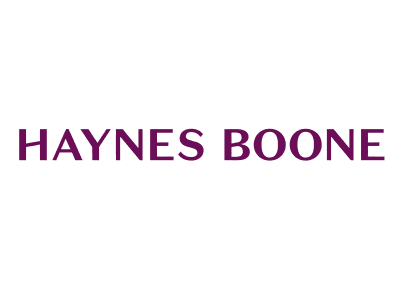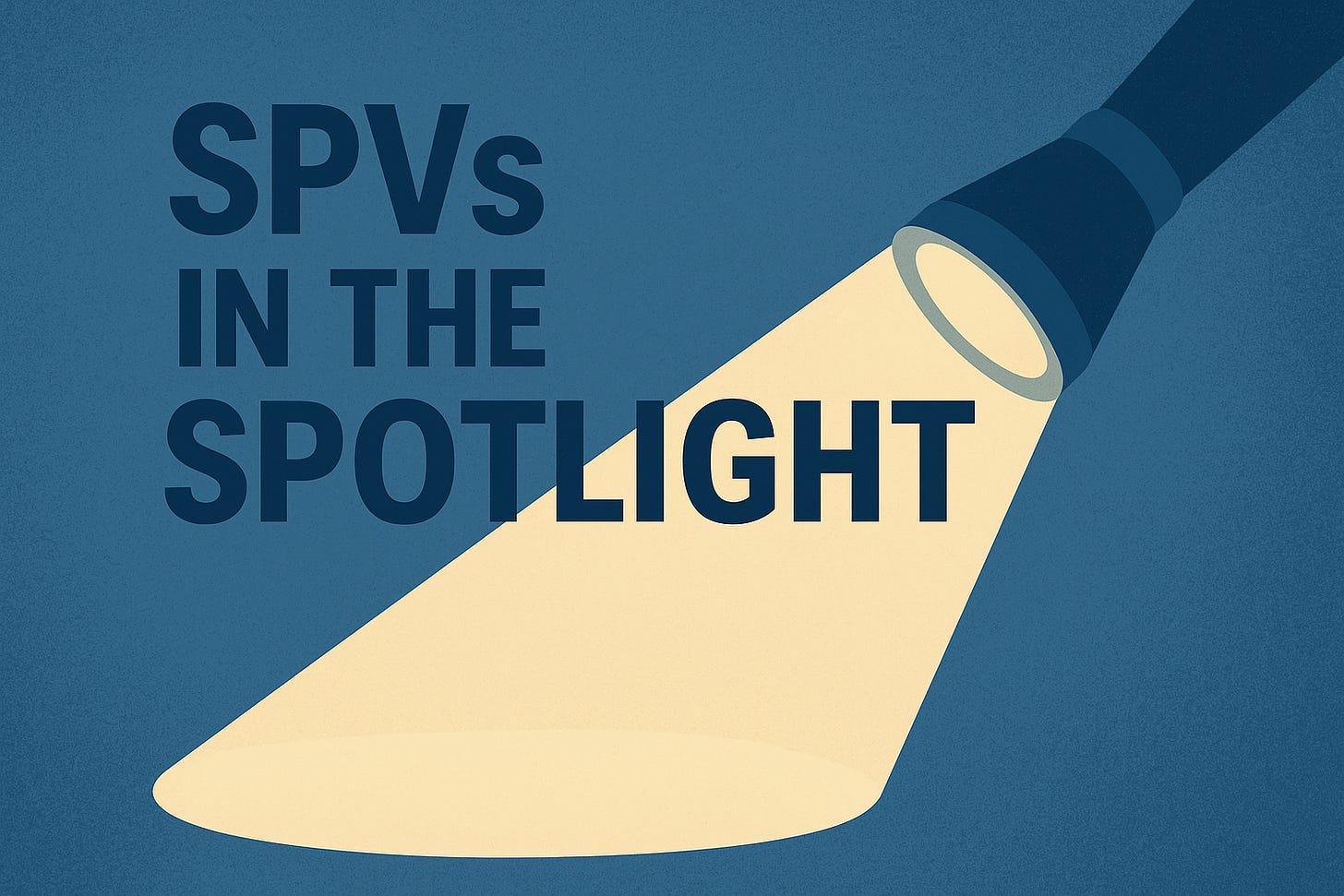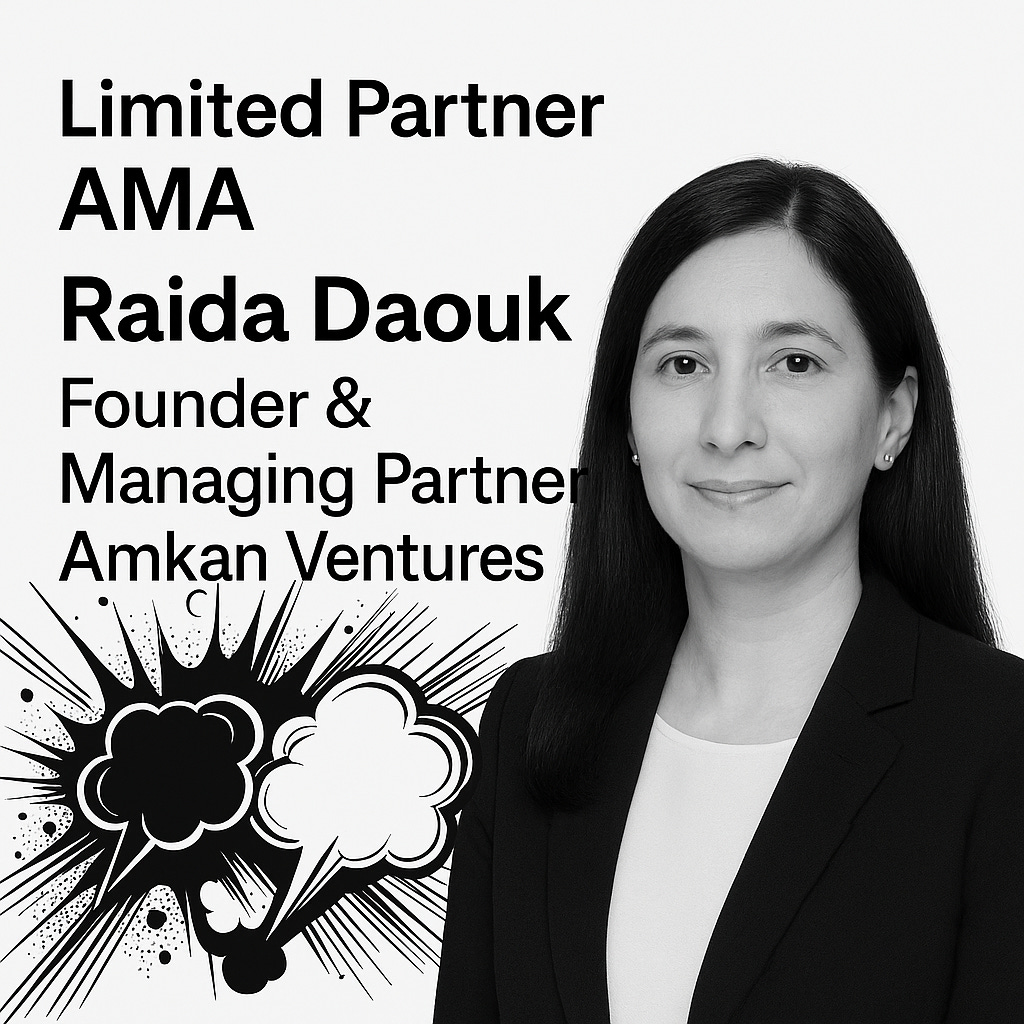From circularity’s hard numbers to single-LP CVC discipline, from pre-seed conviction to firm-size realism, the signal is consistent: Europe isn’t short on talent or ideas—we’ve been short on throughput. That’s changing.
As we continue rolling out Summit conversations from May, their urgency hasn’t faded. Joe Schorge’s orchard metaphor, Kerry Baldwin’s call to translate pensions into venture, and Dom Hallas’ playbook for founder-led policy meet fresh takes on resilience, leadership, and what it means to build durable franchises. Add in the UK’s Q2 data and the SPV debate, and the picture is clear: the next chapter won’t be won by vibes; it’ll be won by mechanisms.
Let’s keep doing the patient work—harvesting, recycling, compounding—and make sure the capital, the rules, and the culture serve the builders.
With 💖
David & Andreas
Table of Contents
🎧 Podcasts of The Week
Paul Morgenthaler, CommerzVentures: Why CVC Works Best with a Single LP
EUVC Summit 2025 | Reece Chowdhry, Concept Ventures: The State of European Pre-Seed
Dom Hallas on Founder-Led Policy & The Startup Coalition's Fight for European Tech
EUVC Summit 2025 | Sebastian von Ribbentrop, Join Capital: The Path to European Resilience
✍️ Insights of the week
🎧 Podcasts of The Week
Enrique Hablutzel, Chi Impact Capital & Marvin Nusseck, Circle Economy: Financing the Circular Economy
Today we welcome Enrique Alvarado Hablutzel, Co-founder and Chief Investment Officer of Chi Impact Capital, and Marvin Nusseck, Finance Lead at Circle Economy. Together they’re behind the landmark Circularity Gap Report, the reference point for tracking how much capital flows into the circular economy — and where it still falls short.
We dive into the latest data, why most money is still chasing recovery-phase solutions with the least systemic impact, the outdated risk models blocking capital flows, and how circularity can address not only climate but also geopolitics, competitiveness, and resource security.
🎧 Here’s what’s covered:
01:00 Why the Circularity Gap Report matters: tracking where capital really flows.
03:00 The numbers: From $10B in 2018 to $42B peak in 2021 — and why momentum slowed.
05:00 VC on the ground: Enrique on why linear models still attract most capital.
07:00 Where the money goes: 50% of flows target recovery, not design or use phases.
08:00 Geopolitics & resources: Why circularity = resource security in a multipolar world.
10:00 Cynics & excuses: Why “China won’t play along” isn’t a reason to sit out.
12:00 Linear risk models: Outdated finance ignores systemic and material risks.
15:00 What’s missing: Correctly pricing resources — recycled vs. virgin.
17:00 Investor levers: Bio-based chemicals, methanol, hydrogen as circular enablers.
20:00 Circularity as systemic lens: Tackling biodiversity, climate, and geopolitics together.
23:00 Local loops: Why Amsterdam and Dutch PP partnerships matter.
25:00 Misalignment: Money goes to transport, but construction offers far bigger impact.
26:00 The 7.2% economy: More than 90% of global materials are still in a linear economy.
You can watch the episode here or add it to your queue on Apple or Spotify 🎧 (chapters for easy navigation are available on both).
Full lifecycle legal advisory for LPs, GPs, startups & scaleups — get to know Haynes Boone.
Paul Morgenthaler, CommerzVentures: Why CVC Works Best with a Single LP
In this episode, Andreas Munk Holm and Jeppe Høier sit down with Paul Morgenthaler, Partner at CommerzVentures, to unpack the inner workings of a single-LP CVC and how strategic structure can drive long-term VC success. Paul shares insights from over a decade of fintech investing, offering a rare look into how one of Europe’s leading corporate venture arms thinks about climate, compliance, and the coming wave of agentic AI in financial services.
They explore what it takes to make a single-LP model work, how GenAI is reshaping fintech workflows, and why European regulation may be a global feature, not a bug.
🎧 Here’s what’s covered:
03:54 How LP alignment shapes internal incentives & decision-making
06:28 What fundraising looks like when your only LP is a bank
12:52 How CommerzVentures handles regulatory risk
15:24 Customer insights from climate fintech portfolio founders
17:27 Climate policy, public budgets & surviving U.S. turbulence
19:10 Why ROI matters more than mission in today’s market
21:11 Timing markets vs. betting on long-term trends
33:35 What metrics matter most in AI x FinTech startups
39:19 Can the EU AI Act be a wedge for new startups?
41:55 Paul’s call to Series A/B fintech founders across Europe
Watch it here or add it to your episodes on Apple or Spotify 🎧. Chapters for easy navigation are available on the Spotify/Apple episode.
EUVC Summit 2025 | David Clarke, (VenCap), Ertan Can (Multiple Capital) & Chloe Dagnell (Isomer Capital): The Path to Superior Venture Returns in Europe
At EUVC Summit 2025, one of the most animated sessions wasn’t about regulation or returns—it was about size.
Fund size.
“You need to back small, early, and smart.”
— Chloé
While some claimed that fund size isn’t predictive of returns, this panel pushed back with a powerful rebuttal: in early-stage venture, size absolutely matters—and skin in the game matters even more.
The Case for Small Funds: Math, Mindset, and Multiples
Chloé laid out the logic:
The earlier you invest, the lower the probability of hitting a mega outcome
But the smaller your fund, the greater your exposure to uncapped upside
“No one thought a $100M fund was too large in the early 2000s. But back then, a $1B exit was 99th percentile. Today? That’s just 85th. A $20B exit is the new 99th percentile.”
In short: outcomes have scaled dramatically—but fund sizes have ballooned even faster.
If you want real multiples, you can’t rely on average returns. You need asymmetric upside.
The Uncomfortable Truth: Most VC Exits Are Still Small
“Average venture-backed exit valuation? Still around $100M.”
That stat alone makes a strong case for micro-funds.
→ A $5B mega fund might get you into elite cap tables—but you’re unlikely to 10x
→ A $30–50M fund? One breakout and you’re a rocketship
And the panel made it clear: LPs chasing “safe” strategies may be missing the real alpha generators.
Page & Associates: Retire the Template
The panel also poked fun at outdated VC modeling tools:
“Can we finally stop using the Page & Associates PDF?”
(Amen.)
This wasn’t just a critique of stale math—it was a call for more creative, conviction-led underwriting in a world where category winners look radically different than they did two decades ago.
Fund Size Isn’t Just Capital—It’s Philosophy
“We’re not looking for averagely good returns. We’re backing for uncapped upside.”
That’s the ethos driving many LPs toward emerging managers and micro funds.
Not to mention the sense of alignment, focus, and nimbleness that often fades in billion-dollar vehicles.
Coming Soon… A Podcast Debate?
This panel had heat—and it wasn’t done.
“Happy to do this again. On a podcast. Longer. Louder.”
Count us in.
Brought to you by Affinity – Exclusive dealmaking benchmarks
Discover dealmaking trends from nearly 3,000 VCs across 68 countries — get the Affinity Investment Benchmark Report.
EUVC Summit 2025 | Reece Chowdhry, Concept Ventures: The State of European Pre-Seed
At EUVC Summit 2025, Reece Chowdhry from Concept Ventures made a bold claim:
Pre-seed isn’t just a quirky corner of venture. It’s the layer that will define the future of European tech.
“Pre-everything. Backing crazy people. No product. No traction. Just vision.”
And if that makes your IC uncomfortable? Good.
Defining Pre-Seed: Where the Real Risk Lives
Reece laid it out clearly:
No product
Often no team
Up to €3M raises
Entry valuations where true upside is unlocked
This is not a place for 60-page memos. It’s a place for conviction, operating instincts, and guts.
“If you’re running a market-sizing exercise at pre-seed, you’ve already missed the point.”
The UK Is (Still) Leading—Sorry, Everyone Else
From unicorn creation to capital deployed to founder density, London continues to pull ahead.
Backed by data (and a few cheeky slides), he reinforced that high-density talent hubs are gravity wells—and London’s orbit is strong.
Pre-Seed is High Risk, High Volume—and High Reward
Reece didn’t sugarcoat it:
“Pre-seed is also about luck. Let’s just say it.”
And that’s why portfolio construction matters.
→ Too many GPs still run over-concentrated portfolios at pre-seed.
→ The layer needs larger portfolios, faster deployment, and more acceptance of variance.
“You want your winners to carry the fund? You better give yourself enough shots.”
The AI Effect: Shrinking the Stack
One of the most striking trends?
“Founders can now go straight from pre-seed to Series A.”
Why?
AI tools let solo operators do more with less
MVPs are faster, GTMs are leaner
Seed rounds are getting compressed—and sometimes skipped entirely
This means pre-seed is becoming a more critical entry point than ever, and if Europe wants to compete, we need more risk-on LPs and ICs willing to lean into the earliest bets.
Join ImpactVC, a global community of 900+ VCs driving change and using venture capital to tackle the world’s biggest challenges—explore their community, resources, and training at impactvc.co.
Dom Hallas on Founder-Led Policy & The Startup Coalition's Fight for European Tech
In this episode, Andreas Munk Holm speaks with Dom Hallas, Executive Director of the UK’s Startup Coalition, to explore how the organization is influencing policy at the intersection of startups, venture capital, and government. From immigration reform to capital access and regulatory red tape, Dom brings a candid view on what it takes to create real impact for founders across Europe.
They dive into the power of founder-first advocacy, the evolving lobbying landscape in Europe, and the urgent need for a united tech voice across the continent.
Here’s what’s covered:
01:10 Why Policy is a Competitive Sport
03:42 GDPR, Brussels & Lessons from Tech Regulation
05:12 What is the Startup Coalition & Who Funds It?
07:13 The Three Buckets: Talent, Capital, Regulation
11:20 Why Founders Need Their Own Voice in Politics
16:31 Making Advocacy Fun, Human & Effective
17:56 What Startups Can Learn from Farmers
21:30 Time Horizons & Playbooks in Policy Work
26:18 How the Coalition Sets its Agenda
31:46 A Crossroads for European Tech
35:46 The Current Policy Agenda: Talent, Finance & Reg
43:27 Funding the Underfunded: Inclusion as Policy
47:01 Regulation That Clears the Way for the Next Thing
🎧 Listen on Apple or Spotify — or queue it for later with chapters ready to go.
Where operational expertise and innovation work for you.
EUVC Summit 2025 | Marius Istrate, Romanian Tech Angels: The Need for Inspirational Leadership in Europe
At EUVC Summit 2025, Marius Istrate didn’t come to pitch a fund or debate capital structures.
He came to talk about something harder to define—but more urgent than ever: inspirational European leadership.
And it wasn’t all comfortable.
“It’s great to win together with others. But we should be capable of winning alone if needed.”
From VC to Vision
Marius spoke as someone who’s helped shape ecosystems from the ground up. As the leader of Romania’s largest angel group, he’s seen firsthand what local ambition looks like—and what it lacks.
“I don’t want to be the VC who accidentally becomes a politician because no one else stepped up.”
But leadership, he argued, isn’t about power. It’s about clarity, empathy, and ownership.
Silicon Valley of Europe? Please.
“If you pinned every place in Europe that calls itself the ‘Silicon Valley of Europe,’ the map would collapse.”
The obsession with copying Silicon Valley is a distraction. What Europe needs isn’t mimicry—it’s confidence in its own identity. And that means policies, capital structures, and culture that reflect our values, not someone else’s blueprint.
Fairness, Dignity, Empathy
One of the most poignant parts of Marius’ talk centered on something distinctly European:
“It’s not fair that I should work more than my parents. It’s not fair that my retirement is uncertain.”
That sense of fairness—a shared European moral compass—isn’t a bug. It’s a feature.
And it can inform the kind of political and ecosystem leadership we need now.
“People don’t want perfection. They want dignity. And when possible, empathy.”
In a time of rising populism and political gridlock, this felt like a quiet manifesto for something different.
A Call to Build What’s Ours
“It shouldn’t be our job to inspire people—because our political leaders should already be doing that.”
Marius wasn’t calling for VCs to become politicians. He was calling for a renaissance of purpose in Europe. For a generation of builders, thinkers, and yes, investors, to step up and fill the vacuum—not with slogans, but with systems, strategy, and soul.
“Give us something to hope for—something we can call our own.”
This wasn’t a policy talk. It was a wake-up call.
And in classic EUVC fashion, it ended with an open invitation: Let’s talk more. Let’s build better. Let’s define what European leadership really means—together.
Discover EU-backed startups, raise capital & connect with innovation leaders — explore Dealflow.eu, the EU-backed platform bridging founders, VCs & corporates.
EUVC Summit 2025 | Sebastian von Ribbentrop, Join Capital: The Path to European Resilience
At the EUVC Summit 2025, the stage belonged to a voice shaped by geopolitics, defense, and the future of industrial innovation: Sebastian von Ribbentrop, Managing Partner at Join Capital.
Sebastian took us on a journey—one that started in Berlin in 2017 with a cornerstone commitment from Eiser Capital, and has since expanded to NATO, Ukraine, and beyond.
Not Just Startups. Not Just Capital.
Join was born when European engineers left corporates like Siemens and Airbus to build their own ventures—but weren’t getting funded.
Sebastian and his team stepped in. Today, with 148 LPs (90% from across Europe’s industrial heartlands), Join has become a backbone for the builders reimagining enterprise and defense.
The paradigm shift became undeniable in 2023, when the NATO Innovation Fund wrote its largest ticket into Join Fund II. It wasn’t just capital—it was a mandate to help reshape defense and industrialization.
A New Industrial Moment
From Washington’s NATO anniversary to trips into Ukraine, Sebastian’s message was clear: the defense supply chain has transformed.
It is now:
Fast
Targeted
Smart
And while Europe faces inefficiencies (43 different tanks vs. one Abrams in the U.S.), it also faces a massive market opportunity.
Billions at Play
The scale is unprecedented:
€200 billion from Ursula von der Leyen into defense & infrastructure
€500+ billion from Germany’s new chancellor, Matz
$500 billion floated by Trump over the next five years
These aren’t subsidies—they’re revenues. Offset programs that give companies the ability to build products, not just pitch ideas.
DARPA, Dual Use & the Technology Race
Sebastian reminded the room: shocks create breakthroughs. Sputnik birthed DARPA, which still deploys $4 billion annually into challenges.
Now, the race is on—dual-use technology, export restrictions, inexpensive smart radar systems taking down next-gen jets.
Europe, he argued, must catch up. But it has the chance to lead.
“Geopolitics,” he quoted Kissinger, “is 100% personal.” And Europe must take responsibility—urgently.
Leadership With Teeth
Sebastian’s talk wasn’t about abstractions. It was about:
How wars reshape supply chains overnight
How NATO’s backing changes venture capital
How Europe can seize its industrial and defense moment
Because leadership in this decade won’t be written in press releases. It will be written in supply chains, radar systems, and the speed of capital deployment.
Congratulations to Sebastian von Ribbentrop and Join Capital—for reminding the ecosystem that industrial innovation isn’t just defense spending. It’s Europe’s opportunity to lead in a world being reshaped, fast.
Make an impact with the bank made for the innovation economy
This Week in European Tech with Dan, Mads & Lomax
Welcome back to another episode of Upside at the EUVC Podcast, where Dan Bowyer, Mads Jensen of SuperSeed, and Lomax unpack the forces shaping European venture capital.
This week: Can Europe build a “VC Alliance” like the US and India? Why pensions remain the missing piece of Europe’s capital markets. Gold, bonds, and macro risk: what really matters for startups. Google’s antitrust reprieve, the UK’s “middling AI power,” and how Europe should play catch-up. Plus: Xi Jinping’s military parade, why manufacturing supremacy is destiny, and quantum’s hot streak in Europe.
Here’s what’s covered:
00:01 Europe’s VC Alliance? Lessons from the US–India deeptech pact
00:06 Europe’s Capital Gap: pensions, late-stage funding, and IPO droughts
00:09 Macro Forces: gold, bonds, deficits, and what founders should care about
00:24 Google’s Antitrust Ruling: no breakup, just data-sharing
00:29 The UK’s Middling AI Power: Eisenberg supercomputer & Europe as a “power user”
00:34 Tesla, humanoid robots, and China’s military parade
00:41 Europe’s Defense & Industrial Base: what’s at stake
00:44 Deal of the Week: Quantum computing’s billion-dollar moment
00:46 Looking Ahead: All-In Summit, new funds, and Lisbon reflections
🎧 Listen on Apple or Spotify — or queue it for later with chapters ready to go.
Google — Start building today with GCP and receive from $2k to $350k in Google Cloud credits
✍️ Insights of the week
UK Innovation Update: Q2 2025
By Kyle Gregorowski, Staff Writer at HSBC Innovation Banking
Key Insights
UK startups raised over $8 billion in H1 2025—3% up from H2 2024.
AI startups captured $2.4 billion, ~30% of total UK VC deals.
The UK received ~30% of all European VC in 2025, making it the continent’s #1 innovation destination.
Though London dominates, 32% of AI deals (57 in total) happened outside capitals—including Oxford, Cambridge, Cardiff, Glasgow.
HSBC’s Q2 2025 Innovation Update outlines the UK’s dominance in Europe’s innovation landscape. Startups raised over $8 billion in just six months—driven largely by AI, which accounted for 30% of total VC investment.
Behind the headline: UK startups have now pulled in over $3 billion in investment every quarter for more than 26 straight quarters, and the innovation ecosystem is valued at an estimated $1.3 trillion. Over half of that comes from companies founded since 2010—highlighting scale and resilience.
While London remains the primary hub (68% of AI financing), regional strength is growing. Oxford, Cambridge, Cardiff, and Glasgow contributed significantly—collectively capturing 32% of all UK AI investment rounds. This underscores expanding depth beyond the capital.
As Simon Bumfrey, Head of Banking at HSBC Innovation Banking UK, notes: the country is not just a leader in Europe, it’s accelerating at a pace that positions it at the forefront of global AI and tech innovation.
SPVs in the Spotlight
Two of the world’s most valuable AI companies took a stand:
OpenAI formally warned investors against “unauthorized” investment vehicles, stressing that any SPV, forward contract, or tokenized structure without its written consent may be void.
Anthropic went further, telling even Menlo Ventures that it must invest directly from its own balance sheet - no SPVs allowed.
At first glance, this looks like a crackdown on secondary trading. But I see something bigger:
The Access Paradox
We’ve entered a strange moment in venture:
Demand for breakout companies has never been higher.
Access has never been more tightly controlled.
The syndicate/SPV model sits right in the middle of this tension.
For founders, SPVs can feel like a loophole - a way for unknown names to sneak onto the cap table without consent. They complicate shareholder dynamics, blur transparency, and often exist to extract fees. No wonder companies like OpenAI and Anthropic are pushing back.
But if we stop here, we miss the real story.
Not All Syndicates Are Equal
Lumping every SPV or syndicate into the same bucket is lazy thinking.
Some are “grey-market wrappers” built to ride hype and scarcity. They add nothing but noise and opacity. Those deserve to die.
But others - when done right - are a form of infrastructure. They:
Walk through the front door invited, not through side deals.
Strengthen GPs and founders by bringing strategic angels, operators and families around the table.
Add trust, transparency, and contribution - not just capital.
The EUVC Model
This is the model we’ve been building at EUVC. Our pledge is explicit:
No backdoors. No ghosting.
GP-first, always. We only invest when we’re invited in.
Contribution over capital. Our members commit not just money, but deal flow, diligence, and ecosystem support.
Because Europe doesn’t need extractive access plays. It needs trusted syndicate infrastructure that expands access while respecting founders and GPs.
This is why I believe the crackdown from OpenAI and Anthropic isn’t the death of SPVs. It’s a wake-up call. Only the right kind of syndicates - the ones companies want at their table - will endure.
And that’s exactly the bet we’ve made at EUVC.
Join the Debate
I unpacked more of these thoughts on LinkedIn and launched a quick poll:
👉 Are SPVs the future of access, or already a relic?
You can cast your vote here - and more importantly, add your perspective. Because this debate isn’t just about AI giants. It’s about the future of access in venture capital, in Europe and beyond.
If this sparks thoughts or you’d like to debate the future of SPVs and syndicates, I’d love to chat.
📩 Reach me directly at david@eu.vc.
Get trusted legal advice for investors & entrepreneurs — from start-up to scale. We know tech — get to know Goodwin here.
Want to learn how a top LP navigates the industry? Join us on September 18th at 1:00 PM CET for an exclusive AMA with Raida Daouk, founder & Managing Partner of Amkan Ventures, the only (so far) fund of funds dedicated to backing solo GPs.
➡️ Register to attend below
With over a decade of experience spanning banking, venture capital, and fund-of-funds investing, Raida Daouk is the Founder and Managing Partner of Amkan Ventures—the first solo GP-led fund of funds in the Gulf region. She has backed several emerging U.S. venture managers and is building a portfolio of early-stage tech funds. Her mission is to bridge Gulf-based family offices with high-performing, hard-to-access venture funds in the U.S., unlocking global opportunities for regional investors.
🤗 Join the EUVC Community
Looking for niche, high-quality experiences that prioritize depth over breadth? Consider joining our community focused on delivering content tailored to the experienced VC. Here’s what you can look forward to as a member:
Exclusive Access & Discounts: Priority access to masterclasses with leading GPs & LPs, available on a first-come, first-served basis.
On-Demand Content: A platform with sessions you can access anytime, anywhere, complete with presentations, templates, and other resources.
Interactive AMAs: Engage directly with top GPs and LPs in exclusive small group sessions — entirely free for community members.
Connect with Europe’s leading LPs, Family Offices & Fund of Funds this September at Château de Beloeil.
Where Europe’s venture capital LPs & GPs connect — curated, high-impact networking | Buy tickets now!
Before you go…
We also wanted to share the final newsletter from the CO-INVESTIN project, which we’ve been proud to be part of. While the project is wrapping up, the mission continues — connecting Europe’s investment ecosystems, bridging funding gaps, and driving more transparency and inclusion. This edition is packed with updates on new collaborations, upcoming roundtables, insights on diversity and impact investing, and highlights from recent forums shaping the future of European venture.































